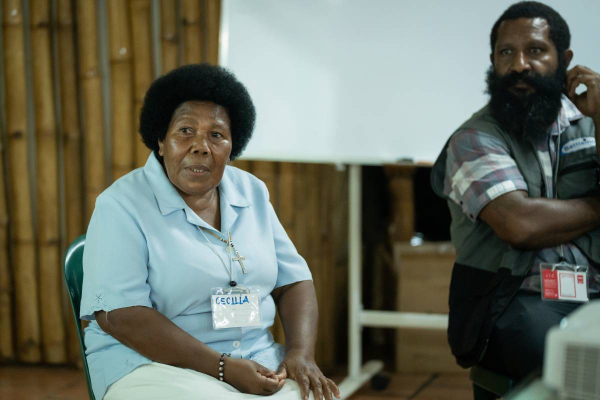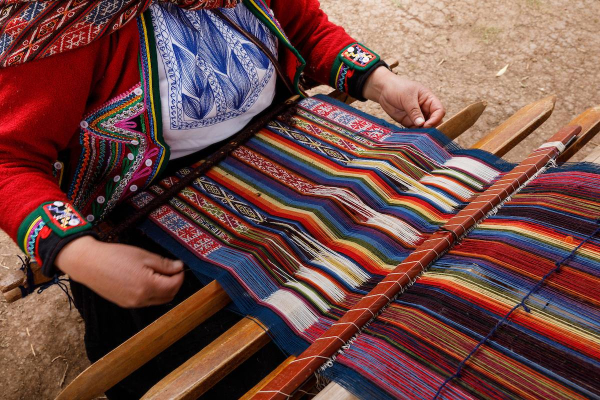Touched by Jesus: Invited Into Belonging

My oldest daughter was born at 4:31 a.m. Exhausted and bleary-eyed from a long labor, I was unaware of most of my surroundings. But one thing is still detailed and clear in my memory — holding my girl for the first time. As I stroked her dark hair and traced her perfectly tiny features, she melted into me, knowing she belonged in my arms.
That baby is graduating from high school this spring and she passed me in height and shoe size a while ago, but sometimes she still needs a tight hug from her mama. No matter how old she gets, she knows she’s always welcome in my arms because she’s mine. She belongs.
Humans are made with a need to belong, and appropriate physical contact with other people is critical to our sense of relationship and wellbeing. Studies have shown the negative effects of a lack of safe touch, which range from developmental and emotional issues to an increased susceptibility to disease.
So imagine living under a law that not only pushed you to the margins of society but also made physical contact with you taboo.
Unclean
In Leviticus, the Israelites were wandering in the desert after 400 years of captivity in Egypt trying to gain a sense of their national identity. More than anything, they needed to know that they were supposed to be different than the surrounding nations — set apart for their God. So God directed Moses to lay out a detailed set of rules for the Israelites governing everything from worship practices to healthcare.
By the time Jesus arrived on the scene, over a thousand years of tradition had shaped the culture, dividing nearly everything and everyone into categories of “clean” and “unclean.”
Jesus studied the law. He knew the command in Leviticus 13:45-46: People with serious skin conditions had to tear their clothing, leave their hair uncombed, call out to warn people of their approach and “live in isolation outside the camp” (NLT). He knew that women with bleeding disorders were considered contaminated (Leviticus 15:25). And he also knew that contact with anyone “unclean” would ceremonially contaminate him too, preventing him from participating in worship at the temple for a time.
Jesus understood that people expected him to avoid those they believed didn’t belong.
But he had his own plan.
The Leper
Near the beginning of his public ministry, Jesus had an encounter with someone that must have raised some eyebrows:
The man’s agony was obvious as he laid face-first on the ground — not just physical pain, but emotional as well. The man said, “If you are willing” (emphasis mine). He didn’t assume Jesus would want to help him; after all, this man was a leper, an outcast and a risk to everyone around him.
What must have he been thinking as he waited for Jesus to respond?
Jesus could have simply spoken aloud and healed the man’s leprosy, restoring his health and place in the community. Instead, Jesus laid his hand on the man while his skin was still diseased, communicating two astonishing truths to everyone: Jesus couldn’t be contaminated, because he was the source of cleansing and wholeness, and he accepted the man while he was still a leper.
The Bleeding Woman
Just a few chapters later in Luke, Jesus once again pushed social boundaries in his response to someone:
A woman in the crowd had suffered for twelve years with constant bleeding, and she could find no cure. Coming up behind Jesus, she touched the fringe of his robe. Immediately, the bleeding stopped. “Who touched me?” Jesus asked. Everyone denied it, and Peter said, “Master, this whole crowd is pressing up against you.” But Jesus said, “Someone deliberately touched me, for I felt healing power go out from me.” When the woman realized that she could not stay hidden, she began to tremble and fell to her knees in front of him. The whole crowd heard her explain why she had touched him and that she had been immediately healed. “Daughter,” he said to her, “your faith has made you well. Go in peace” (Luke 8:43-48, NLT).
After 12 years of suffering and isolation, the woman was desperate for healing — desperate enough to take an enormous social risk. She touched the fringe along the edge of the hem of Jesus’ robe, which wasn’t just for decoration; in Hebrew tradition, that fringe served as a visible reminder of God’s law (Numbers 15:39). A normal man likely would have been angry that she contaminated the holy edge of his robe. He might have made a scene, demanding her punishment and humiliating her even further than her condition already had.
What must she have been feeling when Jesus stopped and asked, “Who touched me?”
Jesus could have let her healing remain a secret, allowing her to slide quietly back into regular life and relationships. Instead, he listened to her story and then gently called her “daughter,” communicating two astonishing truths to everyone: Jesus couldn’t be contaminated, because he was the source of cleansing and wholeness, and he tenderly welcomed her brazen act of faith.
Belonging to Him
Jesus’ interactions with the man with leprosy and the bleeding woman reached beyond their physical ailments to their deeper pain and longing. This man, who left a swirl of miracles in his wake, valued them enough to pause just for them. He stood and intentionally touched the leper. He stayed and compassionately received the touch of the bleeding woman.
These two who knew the hollow ache of loneliness received healing from Jesus, but the greater gift that came with his touch was invitation to belong to him. Before the watching crowds, Jesus allowed them to confess their needs so that he could respond publicly — demonstrating they were whole, wanted, welcome and accepted.
He wiped away the leper’s wounds with a hand that would soon bear its own scars. He stopped the woman’s flow of blood, knowing his own blood would soon flow down the cross. Jesus loved these two outcasts back from the margins into belonging, communicating an astonishing truth — he can do the same for you and me.
Invited Into Reflection
Ask yourself the following questions as you consider how Jesus loved and touched those around him:
- How have I felt rejected or excluded?
- How would my life change if I knew that I was welcome and wanted because I belong to Jesus?
- What areas of my story need to be touched and restored by Jesus?
- Who needs to experience belonging through Jesus and how can I invite them into that?
Your prayers can help bring God’s healing and a sense of belonging to people around the world through Scripture in their own language.






